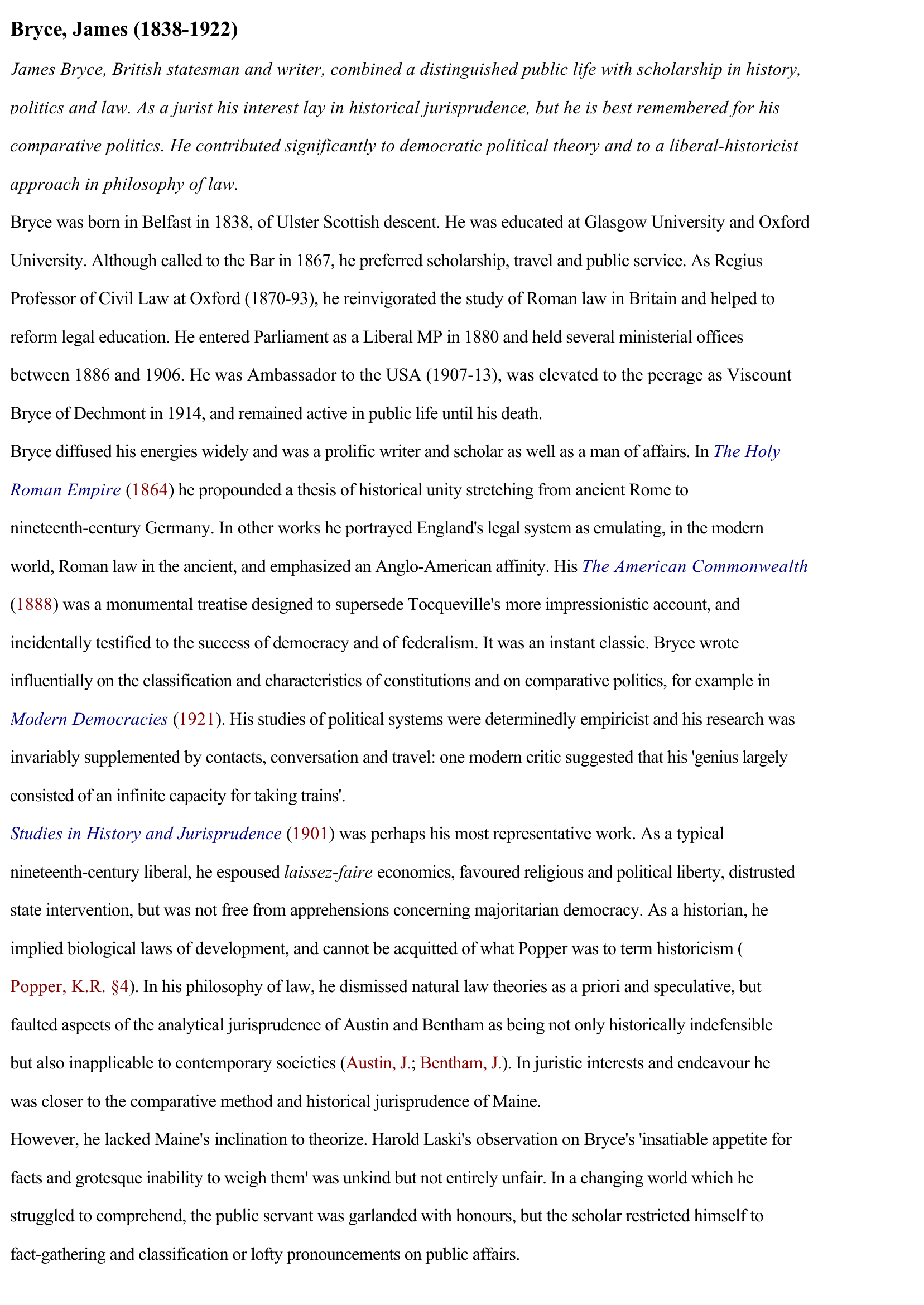Bryce, James
Publié le 16/05/2020

Extrait du document
«
Bryce, James (1838-1922)
James Bryce, British statesman and writer, combined a distinguished public life with scholarship in history,
politics and law.
As a jurist his interest lay in historical jurisprudence, but he is best remembered for his
comparative politics.
He contributed significantly to democratic political theory and to a liberal-historicist
approach in philosophy of law.
Bryce was born in Belfast in 1838, of Ulster Scottish descent.
He was educated at Glasgow University and Oxford
University.
Although called to the Bar in 1867, he preferred scholarship, travel and public service.
As Regius
Professor of Civil Law at Oxford (1870-93), he reinvigorated the study of Roman law in Britain and helped to
reform legal education.
He entered Parliament as a Liberal MP in 1880 and held several ministerial offices
between 1886 and 1906.
He was Ambassador to the USA (1907-13), was elevated to the peerage as Viscount
Bryce of Dechmont in 1914, and remained active in public life until his death.
Bryce diffused his energies widely and was a prolific writer and scholar as well as a man of affairs.
In The Holy
Roman Empire (1864 ) he propounded a thesis of historical unity stretching from ancient Rome to
nineteenth-century Germany.
In other works he portrayed England's legal system as emulating, in the modern
world, Roman law in the ancient, and emphasized an Anglo-American affinity.
His The American Commonwealth
(1888 ) was a monumental treatise designed to supersede Tocqueville 's more impressionistic account, and
incidentally testified to the success of democracy and of federalism.
It was an instant classic.
Bryce wrote
influentially on the classification and characteristics of constitutions and on comparative politics, for example in
Modern Democracies (1921 ).
His studies of political systems were determinedly empiricist and his research was
invariably supplemented by contacts, conversation and travel: one modern critic suggested that his 'genius largely
consisted of an infinite capacity for taking trains' .
Studies in History and Jurisprudence (1901 ) was perhaps his most representative work.
As a typical
nineteenth-century liberal, he espoused laissez-faire economics, favoured religious and political liberty, distrusted
state intervention, but was not free from apprehensions concerning majoritarian democracy.
As a historian, he
implied biological laws of development, and cannot be acquitted of what Popper was to term historicism (
Popper, K.R.
§4 ).
In his philosophy of law, he dismissed natural law theories as a priori and speculative, but
faulted aspects of the analytical jurisprudence of Austin and Bentham as being not only historically indefensible
but also inapplicable to contemporary societies ( Austin, J. ; Bentham, J. ).
In juristic interests and endeavour he
was closer to the comparative method and historical jurisprudence of Maine.
However, he lacked Maine 's inclination to theorize.
Harold Laski 's observation on Bryce's 'insatiable appetite for
facts and grotesque inability to weigh them' was unkind but not entirely unfair.
In a changing world which he
struggled to comprehend, the public servant was garlanded with honours, but the scholar restricted himself to
fact-gathering and classification or lofty pronouncements on public affairs..
»
↓↓↓ APERÇU DU DOCUMENT ↓↓↓
Liens utiles
- James, vicomte Bryce1838-1922A une époque où la scène politique britannique pouvait se glorifier de posséder plusieursérudits de marque, dont Balfour, Haldane et Morloy, Bryce était peut-être le plus considéré.
- L'idée vraie est celle qui paie. William James
- James Watson : La Double Hélice (résumé et analyse)
- James Gleick: la théorie du chaos
- James Boswell


